
BESIDES BANGLADESH, Sekai Lab has development branches in China, Vietnam and Japan. What kind of work do you think you’re going to be doing here?
The word ‘sekai’ means world in Japanese. So Sekai Lab literally means ‘World Lab’. We are a global platform that has been outsourcing IT software engineers since 2014 to deal with the demand for innovation of corporations. To achieve that goal, we first established our software development bases in several Japanese cities. We expanded to Chengdu, China and Danang, Vietnam by increasing the number of clients from Japan and abroad, mainly the US and Singapore. Sekai Lab now holds 300 software development teams in 15 different countries on the globe. As Bangladesh is a country with great potential, Sekai Lab decided to launch its 4th development base in Dhaka.
What made you consider Bangladesh as a potential site for Sekai’s development branch?
I decided to establish our new office here in Dhaka after a tour visiting government offices, the industrial IT organisation BASIS, 30 other IT CEOs and engineers, and universities. I took such a big decision in a relatively short amount of time because I felt this country has a great future. There were three things that really stood out.
First, there are thousands of talented people in this country. Upwork, a well-known global online work platform, ranked Bangladesh fourth in terms of value for money. I was impressed by how passionate the Bangladeshi youth is to contribute to the development of the country. We have even hired two very talented fresh grads from Bangladeshi to work in Tokyo from August.
Second is the country’s untapped potential. Compared to India, which has some mega IT companies like Infosys or Wipro, Bangladesh does not have any company worthy of representing it despite its large population and competitive resources. If you look at Vietnam, a local company called FPT established only 10 years ago holds more than 5000 employees today and operates its business for receiving offshore demand from mainly Japanese clients. I believe the world would respect the Bangladeshi IT industry if there were such a company here. I would like to devote myself towards this goal.
Third is, Bangladesh’s culture. I was moved by the support that we, foreigners, received from individuals, organisations like BASIS, and at times from what seemed like the whole nation. Their support was truly sincere.
What will Sekai Lab Bangladesh be doing? Will it be focusing on any particular type of business?
Sekai Lab Bangladesh is aiming to become a company that can handle mid to large-sized software system development, especially for clients from the US, Singapore and Europe, besides the smaller development work already being done here in Bangladesh. We plan to hire 100 software engineers by the end of 2015, and 1000 by the end of 2017. In the long term, Sekai Lab Bangladesh would not only like to commit to software development but also to IT education, investment and other innovative programs.
I’m sure you’ve gotten a feel for the tech scene here in Bangladesh by now. Where do you think it’s really headed?
I am very optimistic about Bangladesh, especially the IT industry. This country has a talented pool of human resource and it is growing day by day. If this continues, we are going to see more and more IT giants landing here.
Engineer-turned-writer, Shahriar Rahman is Sub-Editor of the tech publication of The Daily Star. He is also Director (Operations) at HiFi Public
Source: The Daily Star









